

The boolean type and boolean operators • Recall that Java provides a data type boolean which can take on only one of two values: true or false. • boolean b = true; // stores the truth value true in b • b = false; // overwrites b with the value false • There are other ways to create boolean values and assign them into boolean variables besides a simplistic direct assignment of a boolean literal into a variable. Boolean operators produce true/false values. • For example let’s assume this declaration: int i = 10; • We can assign a truth value into variable b using boolean operators like this: b = i < 20; • The expression i < 20 is true since I contains the number 10. The value true is then assigned into the variable b. • Let’s look at a summary of all the boolean operators and their behavior. 1
Boolean operators && && is logical and || is logical or true false ! In logical negation true true false (pronounced not ) false false false true and true || true and false true false false and true true true true false true false false and false ! true or true false true true or false true false false or true and -- ALL conditions must be true false or false or -- ANY condition can be true 2
boolean variables boolean variables can have the value true or false. That’s it. boolean minor, foo; int age = 21; foo = true; minor = ( age < 18 ); // (age<18) produces either true or false What value is now in the variable minor ? 3
Relational operators • Relational operators produce boolean values • == equality • != inequality • < less than • <= less than or equal • > greater than • >= greater than or equal • Relational operators have higher priority then boolean operators evaluated as if • x < y && a > b (x<y) && (a>b) • Not a bad idea to parenthesis just for emphasis/clarity 4
Short circuiting practice Short-circuiting happens when the result can be determined before the entire expression has been examined What do each of the following boolean expressions evaluate to ? Which of the following expressions short circuit? boolean a = true, b = false; int c = 6, d = 5; a && (!b) a && b b && a b && (!a) a || d < c d != 10 || b b || c == 6 d > 10 || b 5
More short-circuiting practice boolean a = true, b = false; int c = 6, d = 5; b && (b || c < d) (c < d) || b a && ((! b) || (c < d)) a || b !a !(a || b) !((c > d) && a) (!b && a) || (a && d < c) 6
not has a higher precedence than and/or DeMorgan’s Law DeMorgans Law - any expression can be equivalently expressed by multiplying a NOT through the boolean expression and changing || to && or changing && to || The negation of a conjunction is the disjunction of the negations !(p && q) !p || !q The negation of a disjunction is the conjunction of the negations !(p || q) !p && !q 7
and/or examples • and examples if (age > 6 && age < 19 ) { System.out.println(“You should be in school!”); } if ( age < 18 && milesOverLimit > 20) { System.out.println(“Underage flagrant speeders get double fine!”); fine *= 2; } • or examples if ( letter == ‘A’|| letter == ‘B’ || letter == ‘C’ ) RIGHT if (letter == ‘A’|| ‘B’ || ‘C’ ) WRONG 8
More forms of the if statement Simple conditional : use if if ( age < 21 ) { System.out.println(“too young to drink :=( ”); } Two way branch: use if else if ( age < 18 ) { System.out.println(“too young to drink :=( ”); } else { System.out.println(“Draft or bottle?”); } 9
three way branch - use an if else/if else if ( age < 18 ) { System.out.println(“too young to drink :=( ”); } else if ( age < 70 ) { System.out.println(“Draft or bottle?”); } else { System.out.println(“How about some Geritol instead?”); } 10
Good usage of the if test You may have your if structured like this: if ( <boolean expression here>) { // nothing in the if part } else do something In that case negate the test and put the action under the if instead of the else if ( !<boolean expression here> ) do something Now you don’t need the else 11
Recommend
More recommend